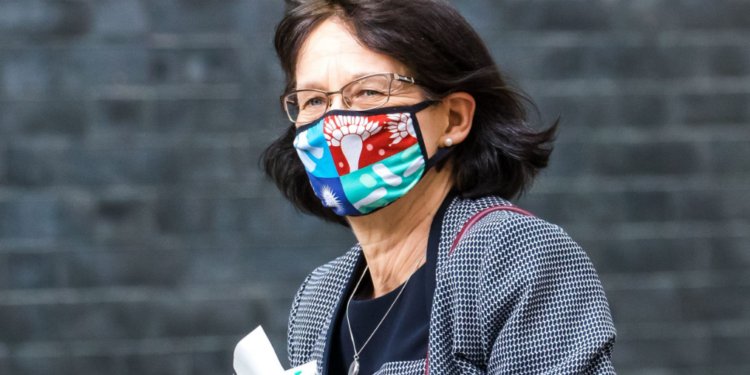In light of some hospitals reimposing mask ‘mandates’, Dr. Gary Sidley has written on behalf of the Smile Free campaign to UKHSA Chief Executive Jenny Harries highlighting the discrepancy between UKHSA’s guidance, which allows for masking, and its literature review, which concedes the evidence for the practice is very poor.
Dear Professor Harries
In light of a few NHS Trusts recently re-imposing mask ‘requirements’, I write this open letter to clarify the UKHSA’s position regarding the wearing of face coverings by staff, patients and visitors in healthcare settings. In particular, would you kindly explain the discrepancy between your current guidance, which, while broadly recommending a return to pre-pandemic normality, continues to allow re-imposition of masks where there is a local appetite for it, and your recent literature review, which concluded the evidence for masks reducing viral transmission was, at best, very weak.
It is apparent that NHS leaders are using your department’s advisory documents to justify the actions of those hospitals that have reinstated mask mandates. In a recent response to our open letter to NHS chief executives signed by over 2,500 U.K. doctors, scientists and medical professionals asking why they are condoning the return of masks, Dame Ruth May (the lead for infection control at NHS England) attempts to justify the actions of these healthcare outliers by citing two documents:
- Your UKHSA guidance titled ‘COVID-19: information and advice for health and care professionals‘;
- A ‘Letter to the NHS’ from NHS England that provides advice on how to interpret your guidance.
Based on the content of these two papers, Dame Ruth is able to resort to the ‘matter-for-local-discretion’ argument to condone the mass-masking re-impositions taking place in a minority of healthcare settings. The scientific evidence pointing to the ineffectiveness of masks as a viral barrier, together with the range of harms associated with them, renders this response inadequate – and bordering on irresponsible – as it perpetuates a postcode lottery where patients in some localities have to endure a sub-optimal service because of the actions of a few mono-focused local infection-control personnel.
It has long been recognised that masks achieve no appreciable reduction in the transmission of respiratory viruses. We knew this in 2015-16 with regard to surgeons and their patients (here and here). We knew this in 2020 from a gold-standard Cochrane review, an analysis of 14 studies on influenza and a healthcare investigation that concluded that masks “may paradoxically lead to more transmissions”. Indeed, in March 2020, you correctly acknowledged this position when you stated that masks “are really not a good idea”. The amount of robust evidence pointing to the ineffectiveness of face coverings has expanded since this time, culminating in the 2023 Cochrane review and the testimony of Dr. Ashley Croft (Consultant Public Health Physician and Medical Epidemiologist) at Scotland’s Covid Inquiry. Furthermore, a study in April this year concluded that mask requirements in a London hospital made “no discernible difference” to Covid transmission rates. And now your own UKHSA guidance acknowledges that the evidence of the effectiveness of non-pharmaceutical interventions (including masks) is “weak” and “would be graded as low or very low certainty”.
But I am sure you would agree that health is about much more than avoiding one virus.
Routine masking, particularly for long periods of time, is increasingly recognised to be associated with a wide range of physical, psychological and social harms (see here for an overview). And a recent research study highlighted the potential risks of elevated carbon dioxide levels associated with long-term mask wear, particularly for children, adolescents and pregnant mothers.
While the scientific evidence is important, it is the human costs of routine masking in healthcare settings that forcefully bring home the dire consequences of this irrational practice: the exclusion of the hard-of-hearing; the re-traumatising of the historically abused; the increased risk of falls in the elderly; the exacerbation of confusion in the already confused; the aggravation of the autistic, anxious and panic-prone; the marginalisation of already stigmatised groups; and the impediment to the goal of soothing the frightened child or suicidal teenager. Faceless interactions impede the development of healing relationships. Humane healthcare, delivered with demonstrable warmth and compassion, will always be more effective than the robotic version emitted by a faceless professional hidden behind a veneer of sterility.
Based on the above, I would respectfully ask that it is time to immediately update UKHSA guidance so as to:
- Acknowledge the ineffectiveness of masks as a viral barrier;
- Explicitly recognise the range of harms associated with the masking of staff, patients and visitors in healthcare settings;
- Actively discourage the routine wearing of masks in all clinical areas.
Thank you for taking the time to read this letter and consider the issues raised. I look forward to hearing from you in the near future.
Dr. Gary Sidley is a retired NHS Consultant Clinical Psychologist and co-founder of the Smile Free campaign.











To join in with the discussion please make a donation to The Daily Sceptic.
Profanity and abuse will be removed and may lead to a permanent ban.